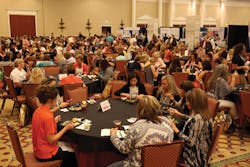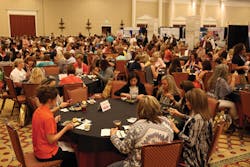Planning for a conference: Getting the most out of a national professional dental hygiene meeting
Getting the most out of a national professional dental hygiene meeting
Jannette whisenhunt
I was privileged this year to attend RDH Under One Roof in Las Vegas, Nevada. As a columnist for RDH magazine, I was graciously offered registration to the meeting, and of course, I accepted the offer. I wanted to meet some of RDH's wonderful columnists and Chief Editor Mark Hartley in person. I was so impressed with the number of hygienists from all over the world who attended this outstanding meeting; I heard that there were over 1,200 in attendance. I hope that many of you were able to attend, and if not, that you will think about attending next year. It was a fantastic meeting!
The meeting is like many professional conferences that help attendees to learn and enhance their education in their fields. During the conference, multiple courses take place at the same time in a variety of rooms. For a first-time attendee or a recent graduate who may not have attended any professional meetings while in school, attending a conference for the first time could be very confusing and intimidating. I want to focus this month on a few things that may help you when you decide to take the initiative to attend a national or even a state-level professional meeting. Conferences can be very fun and exciting, but there are a few things you must know to get the most out of them.
A Canadian hygienist I met at RDH Under One Roof inspired this month's topic. She had two years of experience in the field and asked me some questions about how to handle her registration, her schedule, and finding her classes. She was so excited to be there, and after talking to her, I thought about how intimidating it could be to attend such a large meeting and not really know how to make the most out of it. She told me that she had signed up for several sessions and extra workshops (which cost extra), but she had missed some of her classes that day. She wanted to figure out what she was going to do during the next day in advance. After I showed her how to find the classes she needed, we parted ways. I hope she was able to make the most out of her experience.
When registering for a professional meeting, the first thing you need to do is to look over the registration schedule very carefully. Mark the topics you most want to learn about and then mark any second choices. Once you have done that, look at the schedule to figure out when your desired courses will be offered. After you mark your top choices and look at the schedule, make a tentative schedule for yourself.
This is a good time to determine when you will have time for lunch during the day. Some of the courses you choose may be lunch-and-learns that include your lunch. Other times, lunch might be offered separately from a course, somewhere onsite. Oftentimes you will get a ticket for one of these lunches with your registration packet, included under the cost of your registration fees; if you do, hold on to it because lunch can be expensive at many hotels.
Once courses begin, prepare to arrive early at the rooms for those you want to attend. Some courses fill up quickly. Once a course is full, the doors close, so get there early, find a seat, and stay there. If you find that a course you want to take is too full for you to enter, your second choices may come in handy.
You can expect that a room monitor might scan your badge before you are able to enter a course room. This helps them to know who attended the course for CE purposes. Some courses may involve a CE handout that is distributed in the room or that is accessible online before or after the course. Sometimes you will earn your CE credits by going online and entering the CE code given to you at the end of the course. Other times, you might receive a paper with instructions for documenting your CE credit at the end of the course. It is important to note that you need to stay for the entire course to get credit for the meeting (which is only fair and square).
At most meetings, only those who have registered can attend the courses or enter the exhibit hall. So, if you bring anyone with you who is not attending the meeting, you will want to have something scheduled for them to do while you are in classes. One nice thing about being in Las Vegas was that family or friends could find plenty of fun while courses were in session.
More on the exhibit hall: When you walk in, there will be rows and rows of professional companies that work in and around your field, selling things you use or need for your profession. At RDH Under One Roof, there was a huge room full of vendors. You could spend hours in there, going from booth to booth to learn about the products and get free samples. If you have professional business cards, bring them with you because some companies will send you brochures or samples in the mail, too. I saw many hygienists with goodie bags full of free items they were taking home to try in their offices.
Networking with other hygienists and meeting people from other states or countries is very exciting. It will make you want to go back each year. The education you will get from the courses is amazing and very helpful for your everyday life as a hygienist. You will get educated about topics with which you may have previously been unfamiliar, and you will also get that wonderful feeling that you belong to a huge group of professionals who are dedicated to the practice of dental hygiene. I hope you take the plunge-invest in yourself and in your knowledge as a hygienist.
There are so many great national meetings out there to explore. If you can't attend a big one yet, start at the state or local level. The important thing is to stay in tune with what is going on and always continue to learn. Don't let the big meetings scare you or intimidate you. You can get a lot out of them, and they are worth the time and energy required to get there. Keep learning, and happy scaling! RDH
Jannette Whisenhunt, RDH, BS, MEd, PhD, is the Department Chair of Dental Education at Forsyth Technical Community College in Winston-Salem, N.C. Dr. Whisenhunt has taught since 1987 in the dental hygiene and dental assisting curricula. She has a love for students and served as the state student advisor for nine years and has won the student Advisor of the Year award from ADHA in the past. Her teaching interests are in oral cancer, ethics, infection control, emergencies and orofacial anatomy. Dr. Whisenhunt also has a small continuing education business where she provides CE courses for dental practices and local associations. She can be reached at [email protected].

